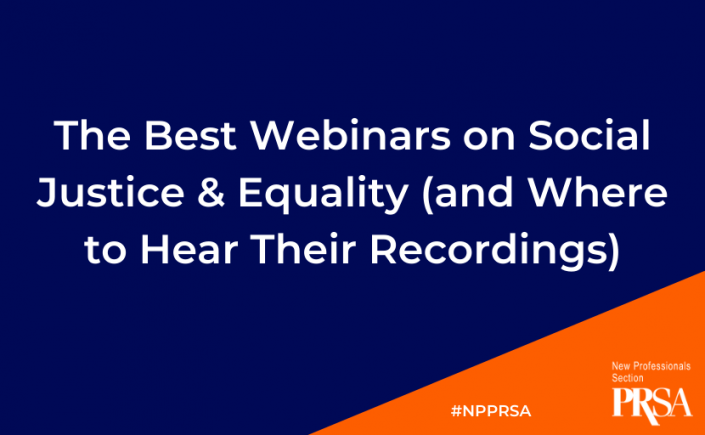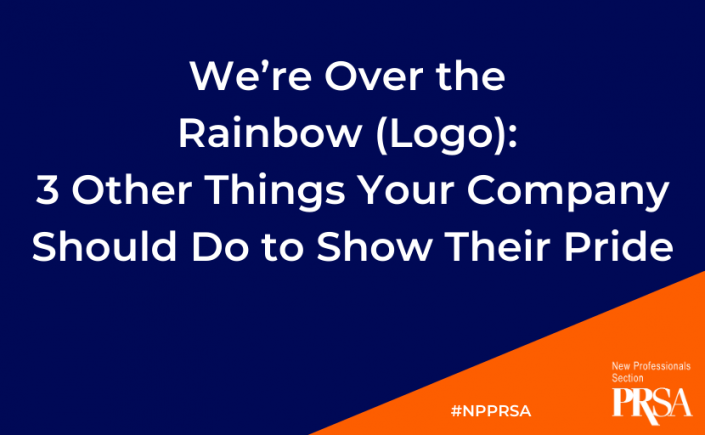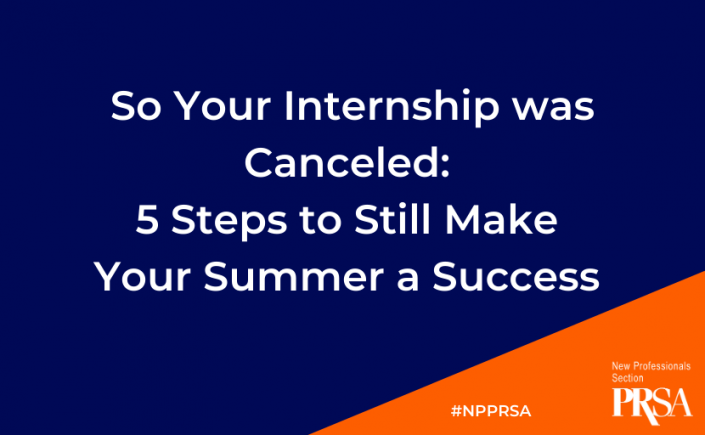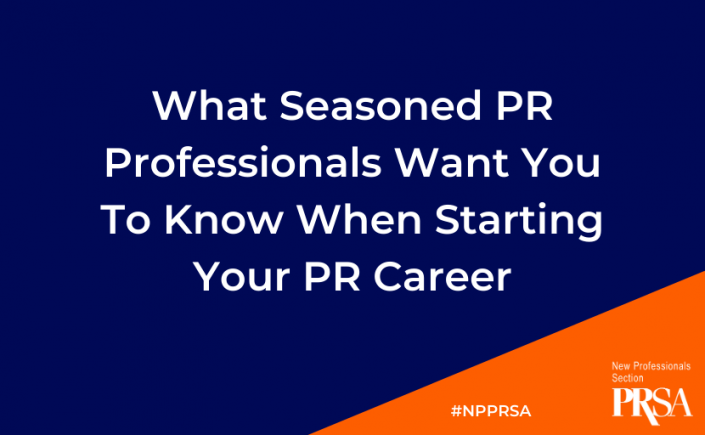We are faced with a multitude of choices in our career journeys. If you’re anything like me, you were relieved and excited when the pieces fell into place and you decided what your dream career would be. But that relief was short-lived when you graduated college and realized that getting a first job that’s related to your career goals is not as easy as you thought it would be.
Things seem so simple when you are inside the structured environment of your university, but once you leave that, you must figure out the answer to the dreaded question: “What’s next?” Trying to break into a career on your own is intimidating, and it’s difficult to know what steps you need to be taking to make progress. But the good news is, there are plenty of things that you can be doing now to make yourself a valuable candidate for your dream job in public relations.
I interviewed 5 seasoned PR professionals who are members of PRSA’s College of Fellows to see what their advice is to those of us who are just starting our PR career journey. They provided wonderful insights that were so helpful and encouraging.
Here are the 6 tips to be successful at the start of your PR career:
1. Be Curious
The most common theme that came up in the interviews was the idea that you must be curious to be successful in the public relations industry. The concept of curiosity comes into play with public relations for several reasons. PR is a job that requires the ability to be dynamic and flexible in your approach. According to the seasoned professionals I interviewed, one important aspect of this is being a life-long
learner.
Katrina Schwarz, APR, Fellow PRSA explained, “You must be willing to put yourself out there and learn, even if it means putting in extra time and effort to get done what needs to get done.”
Dr. Joe Trahan, APR, Fellow PRSA said, “You must have a drive to be the very best, be open to challenges and to take on responsibilities, even if they are not in your specific area.”
Dianne Danowski Smith, APR, Fellow PRSA articulated how important it is to continue your development. She explained, “Your development doesn’t have to necessarily mean getting another degree. It could also be placing a value on growing your skillset. Show an interest in bettering yourself, and you show a willingness to learn.”
Gerry Corbett, APR, Fellow PRSA said, “Have big ears, listen well! This is the key to building knowledge and ability.”
2. Read
A recurring piece of advice from the pros was to be an active reader. I thought this was especially interesting because it’s not something that is commonly associated with professional development, but hearing the interviewees discuss it made me think that it should be! Reading does wonders for training up your mind and keeping you sharp.
Gerry explained, “The more you read, the better you write. Reading trains your brain to be able to write well, simply and quickly; and being able to write is your first key to success in your first PR job.” We all know how crucial it is to be an excellent writer if you want to be successful in public relations, and reading is an amazing way to maintain and grow your creativity and writing abilities.
In addition to this benefit, reading also provides valuable insight that you can use to stay up to date in your industry. Gerry said, “Think about what industry you want to work in and read as much as you can about that. Become a jack of all trades based on what your interests are. Explore blogs on what you want to do, and search PR blogs made by people who are doing what you want to be doing.”
3. Be a Self-Starter
The advice to be a self-starter seems to be everywhere, but what does it mean? A self-starter, according to the pros I interviewed, is all about taking initiative and finding creative ways to find solutions.
Have you been told that you don’t have enough experience to get that job you applied for? Don’t let frustration get the best of you. Be creative and find a way to get that experience. Dr. Joe advised that students can gain experience by reaching out to nonprofits. You can volunteer to write for them and end up with some stellar writing samples and valuable experience to talk about in your next interview.
Are you unhappy with your current job? Make the most out of what you have. Dianne said, “Remember that you may not love your first job, and that’s okay. Your first job is what you make it. If it’s not the perfect job, do what you can to make it the perfect job for now, and try to stay there for two years. You may have to work in opportunities you don’t love, but you can still be an asset to them and grow in the process.”
Being a self-starter is an attitude that employers can sense from you. When asked what she looks for in job candidates, Dianne said, “I assume they have training in writing/communication. I hire for attitude; you can’t teach that. You must always be curious, always interested in what’s going on beyond the surface level. You must show a company what you can do for them, not what they can do for you.”
4. Love Your Client
Kathy Hubbell said that her first mentor taught her the importance of loving your client. Working in public relations means you are constantly absorbing the values and stories of other people and companies. You must absorb them and resonate with them in order to successfully share their story with their audience in a meaningful way. Therefore, you must be passionate about the stories that you are telling. Otherwise, you will not compel any audience.
Kathy advised that new pros be careful when choosing who to work for. She said, “It is important to choose your company as carefully as they choose you. In PR, we promote a company’s values and ethics. If they don’t match yours, you’ll do a terrible job and you’ll be miserable.”
Dianne explained that she had learned something similar in her job. “When you work to make me look good, and I work to make you look good, it benefits everyone!”
5. Be Active
Every single pro who was interviewed discussed the importance of being active in professional organizations and in networking — especially new pros.
When asked what people can do to prepare themselves for success in getting their first PR job, Kathy noted, “Have broad contacts and make yourself available to other people. You can do this in PRSA by attending webinars, online chats — the more the better! PRSA is a non-competitive organization, which means you can search the directory and find someone to ask for advice. As long as it’s not a conflict of interest, they’ll help.”
When asked if there was something that she wished she’d known when starting her career in PR, Katrina said, “I was a late bloomer in taking advantage of networking groups. Get out there and network as soon as possible. Building relationships is something you should start early on.”
Gerry emphasized his belief that having a board of mentors is crucial to your professional development. He said, “it’s good to have a mentor, but it’s better to have a board of them. Find people who are doing what you want to do, get to know them, strike up a conversation with them. Don’t limit yourself to one person, different people can bring different perspectives.”
6. Know Your Value and Be Able to Communicate It
I think Gerry said it best: “KISS: Keep It Simple, Stupid.” We’ve heard this phrase in relation to preparation for interviews, and I think it is especially applicable for landing a position in public relations. You must show that you can communicate your value to your employer, because if you can’t market yourself, how would you be able to market the company?
When asked what he looks for in candidates, Gerry said, “I look for someone who can communicate very succinctly on what values they could bring to an employer. This translates to knowing your value so you can communicate it to them. A candidate is memorable when they can do this. Your resume must also communicate your value.” He added that taking the time to create and practice your 30-second elevator speech is a key to communicating your value to an employer.
Breaking into a new career is not always easy, but is definitely possible. The main takeaway that I got from hearing the advice from these seasoned pros is that we have more control over our career than we may think. It is easy to feel like we must follow a set path to success that is built for us by an employer or professor. And while it is true that development through education and your job experiences is highly important, we can’t forget that the most crucial key to success is the attitude we have and the growth we create on our own.
Being an asset to a company is a skill that we must develop within ourselves. Developing yourself professionally and personally takes dedication, motivation, and creativity. Development is the way to make yourself stand out from everyone else, and it is the way to maximize the value you can bring to an employer — and to yourself.





